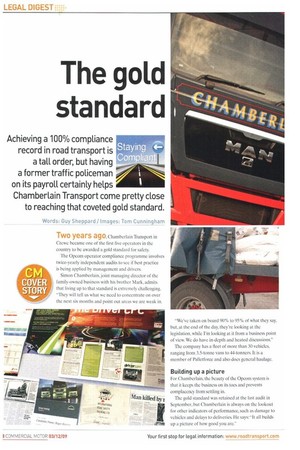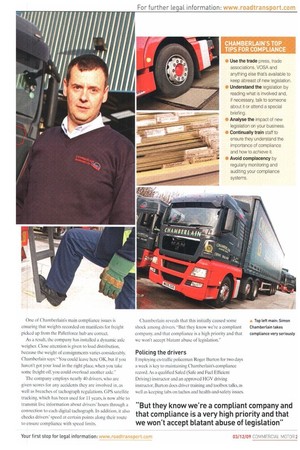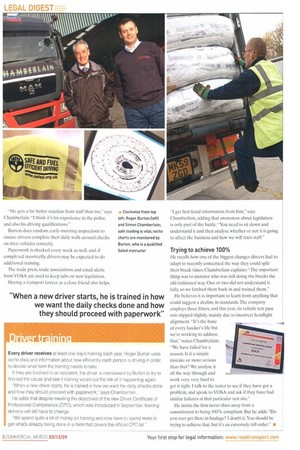The gold standard
Page 30

Page 31

Page 32

If you've noticed an error in this article please click here to report it so we can fix it.
Achieving a 100% compliance record in road transport is a tall order, but having a former traffic policeman on its payroll certainly helps Chamberlain Transport come pretty close to reaching that coveted gold standard.
Words: Guy Sheppard Images: Tom Cunninghar Two years ago, Chamberlain Transport in Crewe became one of the first five operators in the country to be awarded a gold standard for safety.
The Opcom operator compliance programme involves twice-yearly independent audits to see if best practice is being applied by management and drivers.
Simon Chamberlain, joint managing director of the family-owned business with his brother Mark, admits that living up to that standard is extremely challenging. "They will tell us what we need to concentrate on over the next six months and point out areas we are weak in. "We've taken on board 90% to 95% of what they say, but, at the end of the day, they're looking at the legislation, while I'm looking at it from a business point of view. We do have in-depth and heated discussions."
The company has a fleet of more than 30 vehicles, ranging from 3.5-tonne vans to 44-tonners. It is a member of Palletforee and also does general haulage.
Building up a picture
For Chamberlain. the beauty of the Opeom system is that it keeps the business on its toes and prevents complacency from settling in, The gold standard was retained at the last audit in September, but Chamberlain is always on the lookout for other indicators of performance, such as damage to vehicles and delays to deliveries. He says: "It all builds up a picture of how good you are." One of Chamberlain's main compliance issues is ensuring that weights recorded on manifests for freight picked up from the Pal letforce hub are correct.
As a result, the company has installed a dynamic axle weigher. Close attention is given to load distribution, because the weight of consignments varies considerably. Chamberlain says: "You could leave here OK, but if you haven't got your load in the right place, when you take some freight off, you could overload another axle."
The company employs nearly 40 drivers, who are given scores for any accidents they are involved in, as well as breaches of tachograph regulations. GPS satellite tracking, which has been used for 11 years, is now able to transmit live information about drivers' hours through a connection to each digital tachograph. In addition, it also cheeks drivers' speed at certain points along their route to ensure compliance with speed limits.
Chamberlain reveals that this initially caused some Top Left main: Simon shock among drivers. But they know we're a compliant Chamberlain takes company, and that compliance is a high priority and that compliance very seriously
we won't accept blatant abuse of legislation."
Policing the drivers
Employing ex-traffic policeman Roger Burton for two days a week is key to maintaining Chamberlain's compliance record. As a qualified Safed (Safe and Fuel Efficient Driving) instructor and an approved HGV driving instructor, Burton does driver training and toolbox talks, as well as keeping tabs on tachos and health-and-safety issues.
"He gets a far better reaction from staff than me," says A Clockwise from top
Chamberlain. "1 think it's his experience in the police Left: Roger Burton Ileftl and also his driving qualifications." and Simon Chamberlain; Burton does random, early-morning inspections to sate Loading is vital; tacho ensure drivers complete their daily walk-around checks charts are monitored by on their vehicles correctly. Burton, who is a qualified Paperwork is checked every week as well, and, if Safed instructor completed incorrectly, drivers may be expected to do additional training.
The trade press, trade associations and email alerts from VOSA are used to keep tabs on new legislation. Having a transport lawyer as a close friend also helps. "I get first-hand information from him," says Chamberlain, adding that awareness about legislation is only part of the battle. "You need to sit down and understand it and then analyse whether or not it is going to affect the business and how we will train staff."
Trying to achieve 100%
He recalls how one of the biggest changes drivers had to adapt to recently concerned the way they could split their break times. Chamberlain explains: "The important thing was to monitor who was still doing the breaks the old-fashioned way One or two did not understand it fully, so we fetched them back in and trained them."
He believes it is important to learn from anything that could suggest a decline in standards. The company employs three fitters, and this year, its vehicle test pass rate slipped slightly, mainly due to incorrect headlight alignment. 'it's the bane of every haulier's life but we're working to address that," states Chamberlain. "We have failed for a reason. ls it a simple mistake or more serious than that? We analyse it all the way through and work very, very hard to get it right. I talk to the tester to see if they have got a problem, and speak to VOSA and ask if they have had similar failures at that particular test site."
He insists the firm never shies away from a commitment to being 100% compliant. But he adds: "Do you ever get there in haulage? I doubt it. You should be trying to achieve that, but it's an extremely tall order." •














































































































































